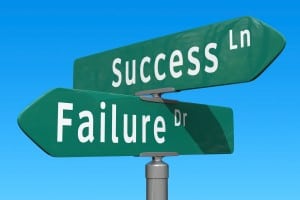
Photo (CC) Chris Potter, on Flickr via stockmonkeys.com
As you probably know, if you are going into business, the odds your business will be around in five years are not good. But they aren’t as bad as you may think, either.
Approximately one-third of businesses close within two years. At the five-year mark, about one-half of all businesses have closed. We don’t approach the commonly cited numbers of 70 to 80 percent of businesses being closed until the 10-year mark.
Also remember that 15 to 20 percent of businesses that close are actually successful, they are breaking even or they are making money, but the owners closes the businesses for other reasons.
So your business chances may be better than you expected. But as an aspiring or startup business owner, what can you do to increase your odds of being one of those who remain in operation?
The first major task is to build a business that solves a problem. That seems simple, but lots of businesses are built because someone has something to sell.
And is your solution something that will last for some time, or will it have a quick burst of sales and then disappear? This means both finding a niche that has some future potential as well as looking forward to what you need to do when the market changes.
Solving a problem is only the first step. People must be willing to pay for your solution. And what they pay must cover your costs and provide a profit.
Ask yourself if other people already are providing the solution. If so, is the market big enough to support another player, and how will you distinguish yourself from the competition? Plus, how easy will entering the field be for others? Answers to these questions will help you understand if you are selling something special or if it is simply a commodity.
As you can see, planning is a key to business continuity. You also need to have adequate cash reserves. When you hear that getting started will take twice as long and cost twice as much money as planned, don’t discount the warning. While these vary, the reminder that things won’t go as planned is very accurate.
Building a sustainable business requires sacrifice, planning, and the ability to pivot and change. Are you ready?










